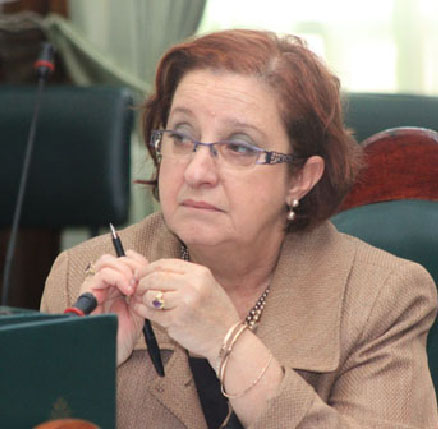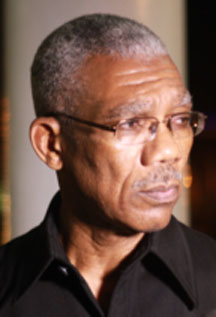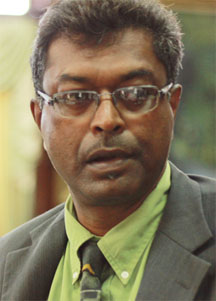Amid concerns about stalled anti-money laundering laws, the private sector yesterday urged the government and the opposition to respect the “national interest” and convene an extra-parliamentary meeting to break the deadlock over the Public Procurement Commission (PPC) and other public oversight bodies.
While the opposition has since signaled that it is open to such a meeting it is unclear whether it will take place and Presidential Advisor on Governance Gail Teixeira yesterday stated that the government wanted an amendment to the Procurement Act to preserve the role of Cabinet in state contracts.

The Private Sector Commission (PSC), which in recent weeks has been blazed by the Alliance for Change (AFC) for its silence on the establishment of PPC, in a release yesterday also called for the rapid establishment of the Integrity Commission as well as the appointment of an Ombudsman.
Though attempts yesterday to reach PSC Vice- Chairman Clinton Urling proved futile, Stabroek News did speak to a member of the body who said that the Commission has always been advocating for the setting up of these constitutional bodies, albeit not in the public domain.
The source explained that as recent as last Friday the PSC Chairman Ron Webster was engaged at which time he [the Chairman] “made his position known” as it relates to the setting up of the PPC.
“I am not aware that the [Chairman] has made the opposition aware of his position but they [government and opposition] need to meet, share their positions and work towards finally constituting this and other bodies.
Asked the reason for the body’s sudden public announcement on the PPC, the source explained that as a non-political entity, the Commission prefers not to pronounce on matters of a political nature. He said however, that the PSC decided to become publicly vocal after considering the implications which abound in the absence of these bodies.
The source said that if possible they would be willing to make suggestions to government and the opposition on the way forward in such a meeting, but said that if this is not possible they would be content with observer status.
The PSC’s statement followed its entreaties to the opposition to work with the government for the passage of the Anti-Money Launder-ing and Countering the Financing of Terrorism (Amendment) Bill considering the risk to the country from non- compliance with international regulations. The PSC was later criticized by the AFC for selective interest.
Proper
framework
Meanwhile, leaders of both A Partnership for National Unity (APNU) and the AFC stated that they would be more than willing to participate in such a meeting.
APNU leader David Granger said “we have no problem taking part in tripartite talks once it is in the proper framework.” Granger said that APNU has been calling or such discussions for some time, and blamed the government for the “procrastination” referred to by the PSC.
“The non-commissioning of these agencies is solely the fault of the type of governance we have here,” argued Granger.
He said that the proper commissioning of these bodies requires good governance, a trait “which the PPP seems to lack.”
“I am willing to participate in any tripartite forum to improve the quality of governance in Guyana as long as it obtains in the proper framework.”

“Why not,” AFC Leader Khemraj Ramjattan stated. “If it is coming from such an important private sector entity the AFC would be more than willing to be part of such an undertaking. We are willing and we are waiting on the President to express similar interests in such a meeting.”
Ramjattan added that he was happy to see the PSC shed its “evasive” approach in dealing with such matters. He said that though these matters may be of a public nature they have very real implications for the private sector.
As such, he said, it is imperative that they play a role in effecting change.
“We don’t want them to be politicians but they must realise that they have a part to play,” Ramjattan said.
Resolving these issues however, may not be as simple as convening an “extra-Parliamentary meeting.”
According to Advisor to the President on Governance, Teixeira, there are strict constitutional provisions for the setting up of the PPC in particular, which do not accommodate such a meeting.
According to Article 212X (1) and (2) of the Constitution, ‘The Public Procurement Commission shall consist of five members who shall have expertise and experience in procurement, legal, financial and administrative matters. The President shall appoint the appoint the members of the Commission after such members have been nominated by the Public Accounts Committee and approved by no less than two-thirds of the elected members of the National Assembly.’
Teixeira explained that the Commission has not yet been set up because for ten years the National Assembly has failed to produce a two-thirds majority vote on the suggested committee members.
In 2011, the People’s Progressive Party Civic (PPP/C) had argued that the delay in appointing the Commission was due to the PNCR’s insistence on unanimity.
However, as noted by former PPP executive Ralph Ramkarran earlier this year, the government has now switched its own position and had also at one stage declared that the appointment of the Public Procurement Commission was not a priority.
Cabinet role

Notwithstanding these utterances, Teixeira yesterday told Stabroek News said that government is willing to work with opposition parties to move forward on the commissioning of the PPC if Cabinet is allowed to retain its supervisory role in the tendering of government contracts. She explained that after the implementation of the 2003 Procurement Act, the government was placed in a position where it would gradually lose this power once the PPC was constituted.
Article 51 (1) of the Procurement Act reads, in part: “The Cabinet and, upon its establishment, the Public Procurement Commission, shall review annually the Cabinet’s threshold for review of procurements, with the objective of increasing that threshold over time so as to promote the goal of progressively phasing out Cabinet involvement and decentralising the procurements process.
Though the Act was implemented in 2003, the Cabinet still holds full powers as it relates to its role in the procurement process owing to the fact that the PPC has not been constituted.
Cabinet presently signals its no-objection to contracts and only then can they proceed.
Teixeira yesterday said that no responsible government would want to give up its ability to oversee the spending of the money which it is making available for the development of its country. As such, she said, the government will be seeking to have this section of the Procurement Act “addressed” so as to ensure that Cabinet retains its oversight privileges
On the issue of the Integrity Commission, Teixeira explained that the president had met with Granger last year to discuss the appointment of officers to this body. She said that the Opposition Leader promised to get back to him but has not done so as yet.
In relation to the appointment of an Ombudsman, Teixeira said that she was unable to make pronouncements on this issue.
In the release yesterday, the PSC stated: “In February this year, the Private Sector Commission wrote His Excellency the President expressing its serious concern over the growing perception of “widespread corruption in our country”. The Commission pointed to the fact that `this perception is strengthened by the government’s lack of attention to the functioning of those institutions to which the government is already committed and which are intended to serve as the bulwark against corruption.’
The commission stated that in their letter to President Donald Ramotar they made specific references to the PPC, the FIU, the Integrity Commission and the appointment of an Ombudsman and urged the he “take the necessary action to have those institutions fully operationalised.”
It also mentioned that in March they teamed up with the Transparency Institute of Guyana to release a statement which emphasized “that the perception of corruption of Guyana is too important to be ignored and negatively impacts on business and investment,” and once again called for the appointment of these committees and an Ombudsman.
The PSC said “the time has long passed for the government and the political opposition to respect and put the national interest before their political agenda and give effect to the Constitutional commitment that they have made to the electorate an the nation in setting up these Commissions.”
The body argued that it is this attitude which continues to delay the conclusion of deliberations of the Anti-Money Laundering and Countering the Financing of Terrorism (Amendment) Bill (AML/CFT), effectively placing Guyana and its people at risk
On Thursday it was announced that the next meeting of the Special Select Committee charged with reviewing the AML/CFT will take place on June 12th, 2013. Also, with the next parliamentary hearing pushed back to June 13th, all hopes of having the bill passed by the May 27th deadline set by the Caribbean Financial Action Task Force should be abandoned.
It is unclear whether the PSC received a response from President Ramotar to its letter.
The PSC’s call also came in wake of a similar one by the Guyana Manufacturing and Services Association (GMSA), which in urging the passage of the amendments to the anti-money laundering laws also noted the need for the establishment of both the Procurement and Integrity bodies.
The GMSA, in a statement on Wednesday, sounded its concern over the implications of the country missing the deadline to pass anti-money laundering amendment bill, saying the gains that local entrepreneurs have fought for and won in the international marketplace could quickly erode.
At the same time, the group said “all parties” must take cognisance of the issues and concerns surrounding other contentious legislation and the need to set up the PPC and to re-establish the Integrity Commission.
“There has to be a rapprochement among all the representative parties for the entire process to work for the good of Guyana,” it said, urging members of the National Assembly to work towards voting the amendments into law and for the promises to establish the key oversight commissions to be honoured.
“The GMSA is looking forward to the various parties in the National Assembly finding agreement on these particular issues as soon as possible,” it said, adding that this would definitely redound to the greater good of every citizen, individually and collectively.









